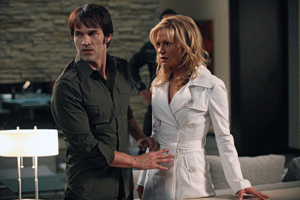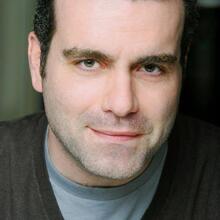True Blood, HBO’s contribution to the burgeoning vampire industry, presents itself as a more sophisticated and edgy alternative to the “Twilight” film franchise. But the only thing sharp about “True Blood” is the prosthetic fangs glued to the actors’ teeth. The series is a wheel-screeching detour in HBO’s journey toward becoming the home of thought-provoking television.
“True Blood” reveals the dissonance brought about by writers and directors who romanticize the vampire narrative while refusing to acknowledge the inherent violence at play. Like countless tales before it, “True Blood” attempts to glamorize the sexual aspect of the mythology, while at the same time diminishing (and dismissing) what is essential to any vampire tale: the violent assault.
Over the past ten years, HBO has produced arguably the best television shows in the business. “The Sopranos,” “Curb Your Enthusiasm” and “Six Feet Under,” if not everyone’s cup of tea, at least filled the paper cups at the water cooler on Monday morning. Somewhere in HBO’s 30-plus year history the network decided that replaying Will Smith and Julia Robert’s vehicles ad nauseum was not enough to maintain its visibility as the premiere cable network. So it began dipping its toes into the world of series programming.
The results have been remarkable. Recognizing the dearth of intelligent, well-written shows for adults over 35 in a television world beholden to the whims of teenage girls and males between 18 and 30, HBO found its niche. This was thanks in no small part to its ability to present shows without commercial interruption and, perhaps more importantly, without the censorship restrictions imposed upon network and basic cable programs.
While one could reasonably object to the aggressive bent with which HBO promoted sex and violence, it would be difficult to argue with the quality of shows like “The Sopranos” and “The Wire.” But as is always the case in idylls, someone showed up and ruined the party for everyone else. And at this soirée “True Blood” has taken more than its fair share of the punch.
The show stars Anna Paquin--miles away from her prodigious Oscar-winning turn as Holly Hunter’s rage-fueled tot in “The Piano”--as Sookie Stackhouse, a telepathic cocktail waitress spinning her wheels in small-town Louisiana. We are supposed to believe that Sookie is an intelligent young woman, providing the ethical core in an otherwise morally bankrupt southern town—replete with all the southern stereotypes we have come to expect from lazy writers. But Sookie comes off not so much intellectually and morally superior, as much as a hyper-eager college freshman, ready, willing and able to jump onto any new cause that comes her way.
It comes as no surprise that our heroine falls in with a group of vampires—it’s almost an inevitability that a teenager with an above-average I.Q. who feels marginalized by her surroundings will wind up hanging around with kids dressed in black who take themselves too seriously. All well and good for a teenager, but Sookie is in her mid-20s. And she is the eyes and ears by which the sophisticated HBO viewer must see the upside down world of Bon Temps, Louisiana.
The show has its better moments, though most of them seem to occur when none of the vampires are onscreen. The opening credits promise much, with the rockabilly-inspired theme music accompanying a morbidly fun montage of perverse images that suggests Flannery O’Connor meets Diane Arbus. Sadly, the rest of the show never lives up to its the first 45 seconds. Instead, it leaves viewers with a bunch of actors with southern dialects of dubious origin and acting skills out of Posing and Glowering 101.
The performances are not all bad. Particularly impressive is the performance of Rutina Wesley as Sookie’s childhood friend Tara Thornton, whose direct, no-frills acting is a welcome relief in a sea of community-theater-level performances. Tara is a force of nature, a seething cauldron of a woman weighted down by circumstance and history, whose unwillingness to capitulate is rooted in an unmitigated lust for life.
The same cannot be said for most of the other performances. Stephen Moyer, in leading-man mode as the principal vampire Bill Compton, in his finer moments elicits the angst-ridden quality of a young rock star. Unfortunately, Mr. Moyer seems a decade too old for that kind of performance and winds up looking less like a tormented vampire and more like a soccer dad going through a mid-life crisis.
The writing of the show is also too earnest, the characters either spitting out recycled lines from a century’s worth of bad vampire movies or social messages that might as well be painted on the characters’ foreheads. Too much is going on, and none of it is done particularly well. The worse thing you can say about pulp is not that it is bad, but that it is mediocre—as it is in “True Blood.”
Not by accident is the most successful film in the vampire genre F. W. Murnau’s silent masterpiece “Nosferatu,” which presents a repulsive and menacing Max Schrenk in the leading role. Murnau recognized the fundamentally repellent aspect of the vampire narrative—a life-taking entity that threatens at a most primitive level. Much as we might like to romanticize the physical act of the vampire—the teeth into flesh—it is merely window dressing. The “reality” of the situation is far more ominous.
The notion of vampire as erotic works only in the most simplistic sense; it is impossible to extract the violent predatory aspect from the genre without rendering the story hackneyed and contrived. Is it any wonder that after a century of vampires sweeping across the celluloid we are still left with the same stock, embarrassingly pseudo-sexual portrayals? The continual insistence upon romanticizing and eroticizing the vampire without acknowledging the violence at the genre’s core makes for contrived viewing that appeals primarily to teenage girls or fans of soft-core pornography.
“True Blood” has very little truth about it. It attempts to follow in the large footsteps of shows like “The Sopranos” and “Six Feet Under” by amping up the sex and violence quota while missing the very best things those shows had to offer: smart, artistic and honest work.
Anemic
Show Comments (
)
Comments are automatically closed two weeks after an article's initial publication. See our comments policy for more.
The latest from america
As we grapple with fragmentation, political polarization and rising distrust in institutions, a national embrace of volunteerism could go a long way toward healing what ails us as a society.
I forget—did God make death?
you discovered heaven spread to the edges
of a max lucado picture book
The joys and challenges of a new child stretched me in ways I couldn’t have imagined.








